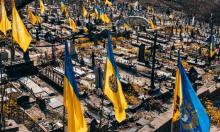India, US make progress on nuke deal
India and the US have made "significant progress" in realising the goal of civilian nuclear energy cooperation with New Delhi unveiling a credible separation plan of its civilian and military nuclear facilities. The crucial separation plan was unveiled for the first time by Foreign Secretary Shyam Saran during his discussions with his counterpart, Undersecretary of State for Political Affairs Nicholas Burns on Thursday.
The plan, which reportedly seeks to place a large number of India's civilian nuclear facilities under international safeguards, received a positive response from top US officials, including US Secretary of State Condoleezza Rice, diplomatic sources said.
"Significant progress was achieved in developing a mutual understanding of the steps needed to advance the early implementation of the agreement," said a press release issued by the Indian embassy at the end of Saran's two-day visit on Thursday.
During Saran's visit, the two sides "exchanged views" on the implementation of their respective commitments on nuclear energy cooperation under the July 18 joint statement.The finer details of implementing the agreement were discussed during the second meeting of the joint working group (JWG) on civil nuclear energy cooperation. The JWG was co-chaired by Saran and Burns.
The next JWG meeting is likely to be held in January 2006 in New Delhi.The separation plan, once it is officially approved by the Bush administration, will be presented to the US Congress, which will take a final call on changing tough domestic non-proliferation laws in favour of India.
Both sides are, however, upbeat about the outcome of this process and are hopeful that decisive steps for implementing the deal could be taken before US President George Bush's visit to India early next year.
"The two sides expressed satisfaction at the progress achieved in taking the Indo-US strategic partnership forward and agreed that President Bush's forthcoming visit to India would be a landmark event in India-US relations," said the Indian embassy.
Saran's meeting with Senate Foreign Relations Committee chairman Richard Lugar, an influential non-proliferation hawk, could be very crucial in unlocking India's civilian nuclear cooperation with the US and paves the way for cooperation from the powerful Nuclear Suppliers Group, reports Hindustan Times. I.L.
Subscribe to Pravda.Ru Telegram channel, Facebook, RSS!




